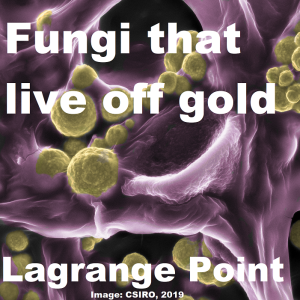Episodes

Monday Aug 12, 2019
Monday Aug 12, 2019
To celebrate National Science Week in Australia we are turning our attention to Australian research on the global scale. This week it means tales from microbiology. Stories of how life can survive or sometimes thrive in strange situations. Whether it be Fungi that eat gold, or bacteria chewing deadly gas, microbiology is always full of surprises. How do the tiniest parts of the food-web of our oceans hunt for food in the swirling of stagnant currents of the ocean? How do bacteria turn deadly gas into a food source? Is the secret to tuberculosis's resistance its ability to survive off deadly gas? How do bacteria turn carbon monoxide and hydrogen into something palatable?
References:
- Cordero, P. R., Bayly, K., Leung, P. M., Huang, C., Islam, Z. F., Schittenhelm, R. B., . . . Greening, C. (2019). Atmospheric carbon monoxide oxidation is a widespread mechanism supporting microbial survival. The ISME Journal. doi:10.1038/s41396-019-0479-8
- Islam, Z. F., Cordero, P. R., Feng, J., Chen, Y., Bay, S. K., Jirapanjawat, T., . . . Greening, C. (2018). Two Chloroflexi classes independently evolved the ability to persist on atmospheric hydrogen and carbon monoxide. The ISME Journal. doi:10.1101/457697
- Lehmann, E. (n.d.). Gold-coated fungi are the new gold diggers. Retrieved from https://www.csiro.au/en/News/News-releases/2019/Gold-coated-fungi-are-the-new-gold-diggers
- Bohu, T., Anand, R., Noble, R., Lintern, M., Kaksonen, A. H., Mei, Y., . . . Verrall, M. (2019). Evidence for fungi and gold redox interaction under Earth surface conditions. Nature Communications, 10(1). doi:10.1038/s41467-019-10006-5
- Holland, D., & University of Melbourne. (2019, August 05). The superheroes of nutrient detection living in our oceans. Retrieved from https://pursuit.unimelb.edu.au/articles/the-superheroes-of-nutrient-detection-living-in-our-oceans#
- Brumley, D. R., Carrara, F., Hein, A. M., Yawata, Y., Levin, S. A., & Stocker, R. (2019). Bacteria push the limits of chemotactic precision to navigate dynamic chemical gradients. Proceedings of the National Academy of Sciences, 116(22), 10792-10797. doi:10.1073/pnas.1816621116
Version: 20241125


Comments (0)
To leave or reply to comments, please download free Podbean or
No Comments
To leave or reply to comments,
please download free Podbean App.